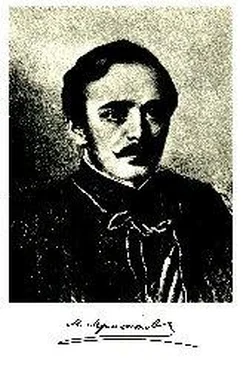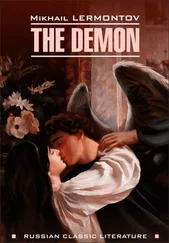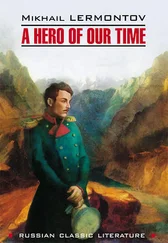We sat that way for a long time. The sun was setting behind the frigid peaks and a milky mist was spreading through the valleys when we heard the tinkling of bells and the shouting of drivers outside. Several carts with grimy Armenians drove into the courtyard, followed by an empty carriage whose lightness, comfort and elegance gave it a distinctly foreign air. Behind walked a man with a huge mustache wearing a braided jacket. He was rather well dressed for a manservant, but the way he knocked the ashes from his pipe and shouted at the coachman left no doubt as to his position. He was obviously the pampered servant of an indolent gentleman-something of a Russian Figaro [66] comic character from 1785 and later operas.
. "tell me, my good man," I called to him from the window, "is it the 'occasional'?" He looked at me rather insolently, straightened his neckerchief and turned away. An Armenian who'd been walking beside him smiled and replied for him that it was indeed the "occasional" and that it would set out on the return trip the next morning. "Thank God!" said Maksim Maksimich who had just come to the window. "A fine carriage!" he added. "Probably some official on his way to conduct a hearing in Tiflis. You can see he doesn't know our hills. No, my dear fellow, they're not for the likes of you. Even an English carriage wouldn't stand the jolting! I wonder who it is-let's find out..." We went into the hallway, at the far end of which a door was open into a side room. The valet and the driver were lugging in suitcases.
"Listen, friend," the captain asked the valet, "whose is that fine carriage, eh? A splendid carriage indeed!" The valet muttered something inaudible without turning and went on unstrapping a case. This was too much for Maksim Maksimich, who tapped the insolent fellow on the shoulder and said: "I'm talking to you, my man..."
"Whose carriage? My master's."
"And who is your master?"
"Pechorin."
"What did you say? Pechorin? Good God! Did he ever serve in the Caucasus?" Maksim Maksimich exclaimed, pulling at my sleeve. His eyes lit up with joy.
"I believe so... but I haven't been with him long."
"Well, well, there you are! Grigoriy Aleksandrovich is his name, isn't it? Your master and I used to know each other well," he added, with a friendly slap on the valet's shoulder that nearly made him lose his balance.
"Excuse me, sir, you are in my way," said the latter, frowning.
"What of it, man! Don't you know I'm an old friend of your master's, we lived together, too. Now, where can I find him?"
The servant announced that Pechorin had stayed behind to dine and spend the night with Colonel N-.
"He won't be here tonight?" said Maksim Maksimich. "Or perhaps you, my good man, will have some reason to see him? If you do, tell him Maksim Maksimich is here-you just tell him that and he'll know... I'll tip you eighty kopecks…"
The valet put on a superior air on hearing this modest offer, but nevertheless promised Maksim Maksimich to run his errand.
"He'll come at once, I'm sure!" Maksim Maksimich told me triumphantly. "I'll go out to the gates to meet him. Pity I don't know N-."
Maksim Maksimich sat down on a bench outside the gate and I went into my room. I must admit that I too awaited the appearance of this Pechorin with some eagerness, for though the captain's story had not given me too favorable a picture of the man, some of his traits nevertheless struck me as quite remarkable. In an hour one of the veterans brought in a steaming samovar and a teapot. "Maksim Maksimich, will you have some tea?" I called to him from the window.
"Thank you, I really don't care for any."
"You'd better have some. It's late already and getting chilly."
"No, thank you …"
"Well, as you wish!" I said and sat down to tea alone. In ten minutes or so the old man came in. "I suppose you are right," he said. "Better have some tea... You see, I was waiting. His man has been gone a long time-looks as if something has detained him."
He hastily gulped down a cup of tea, refused a second, and went back to the gate, obviously upset. It was clear that the old man was hurt by Pechorin's unconcern, all the more so since he had spoken to me so recently about their friendship, and only an hour before had been certain that Pechorin would come running as soon as he heard his name.
It was late and dark when I again opened the window and called to remind Maksim Maksimich that it was time to go to bed. He muttered something in reply and I urged him again to come in, but he didn't answer.
Leaving a candle on the bench, I lay down on the couch, wrapped myself in my overcoat and was soon asleep. I would have slept peacefully all night had not Maksim Maksimich awakened me when he came in very late. He threw his pipe on the table, began pacing up and down the room, then fussed with the stove. Finally he lay down, coughing, spitting, and tossing about for a long time.
"Bedbugs bothering you?" I asked.
"Yes, bedbugs," he replied with a heavy sigh.
I woke up early next morning, but Maksim Maksimich had already got up. I found him sitting on the bench at the gate. "I've got to see the commandant," he said, "so if Pechorin comes will you please send for me?"
I promised to do so. He ran off as if his legs had regained the strength and agility of youth.
It was a fresh, fine morning. Golden clouds piled up on the mountains in a phantom range of summits. In front of the gates was a broad square, and beyond it the market place was seething with people, for it was Sunday. Bare-footed Ossetian boys, birchbark [67] Nabokov uses the term "bags" here because the local people were known to collect honey in goatskins.
baskets laden with honeycombs strapped to their backs, crowded around me, but I drove them away for I was too preoccupied to give them much thought. The good captain's anxiety was beginning to claim me too.
Ten minutes had not passed when the man for whom we had been waiting appeared at the far end of the square. With him was Colonel N-, who left him at the inn and turned back towards the fort. I immediately sent one of the veterans for Maksim Maksimich.
Pechorin was met by his valet who reported that the horses would be harnessed in a moment, handed him a box of cigars, and, having received a few instructions, went off to carry them out. His master lit a cigar, yawned once or twice and sat down on a bench on the other side of the gate. Now I would like to draw you his portrait.
He was of medium height. His erect, lithe figure and broad shoulders suggested a strong physique equal to all the hardships of the road and variations of climate, unweakened by either the dissolute life of the capital or emotional storms. His dusty velvet coat was open except for the last two buttons, revealing an expanse of dazzlingly white shirt that betrayed the habits of a gentleman. His soiled gloves seemed to have been made for his small, aristocratic hands, and when he pulled off a glove, I was amazed at the slenderness of his white fingers. His walk was careless and indolent, but I noticed he didn't swing his arms-a sure sign of a certain reticence of character. But these are my personal opinions based on my own observations, and I can't compel you to accept them blindly. When he sank down on the bench his straight frame sagged as if he hadn't a bone in his back. His whole posture now betrayed some nervous weakness. He sat as the thirty-year-old coquette [68] or coy woman: from his short novel, La femme de trente ans (1834)
in balzac's book might sit in a cushioned easy chair after an exhausting ball. At first glance I wouldn't have thought him more [28] the age is of interest since he insults the young cadet, who was about 21, a few years before, in "Princess Mary," and because a psychoanalytic interpretation of Pechorin's personality indicates narcissism and inordinate concern about his appearance and being an adult, or at least so say some experts.
than twenty-three years old, though later I was ready to admit he looked thirty. There was something childlike in his smile. His skin was as delicate as a woman's, and his naturally curly fair hair made a pleasing frame for his pale, noble brow on which only careful scrutiny could disclose a fine network of wrinkles that probably were a good deal more in evidence at times of anger or spiritual anxiety. In spite of his light hair, his mustache and eyebrows were black-as much a sign of pedigree in a man as a black mane and tail are in a white horse. To complete the portrait, I will say that he had a slightly turned-up nose and that his teeth were dazzlingly white and his eyes hazel-but about his eyes I must say a few more words.
Читать дальше

![Михаил Лермонтов - A Hero of Our Time [New Translation]](/books/27671/mihail-lermontov-a-hero-of-our-time-new-translati-thumb.webp)










